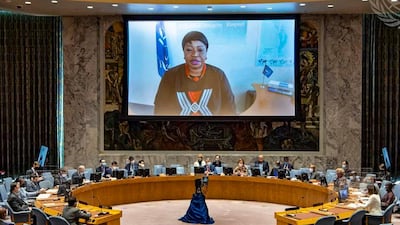The UN General Assembly will vote on Friday to decide which five countries win seats to the Security Council, its top decision-making body, for two-year terms starting next year.
The UAE, Albania and Brazil are all but guaranteed seats as they are the only candidates from their regions.
Ghana and Gabon are set to take the two African seats after the Democratic Republic of the Congo withdrew from the race.
Brazil has served on the council 10 times, Gabon and Ghana three times each, and the UAE once, in 1986-1987. Albania has never served on the council.
A candidate country needs at least two thirds of votes in the UN General Assembly, which means at least 129 votes are required to win a seat if all 193 UN member states cast ballots.
Candidate nations in uncontested seats still seek high vote tallies and spend months ahead of balloting speaking with friends and allies around the world.
The UAE, one of a small number of countries with good relations with both the US and China, has pitched itself as a bridge builder in a polarised world, when co-operation is needed more than ever.
Read More
Small island nations are struggling to recover from the pandemic, UN says
Saudi-led coalition intercepts Houthi drone attack on Khamis Mushait
“Pandemics, climate change, nuclear proliferation, cyber attacks: no single country can address these threats alone,” Lana Nusseibeh, the UAE’s ambassador to the UN, said this week in a pre-election briefing.
“The multilateral system is only as strong as the commitments of its member states.”
The five elected non-permanent members will join the council on January 1 and leave at the end of 2023.
The UAE’s journey back on to the council has been years in the making. Its candidacy was endorsed by the Arab League in 2012 and by the UN group of Asia-Pacific nations last year.
The 15-nation council has 10 seats for temporary members but is dominated by its five, permanent members, Russia, China, the US, Britain and France, which have the power of veto.
It meets regularly to discuss threats to international peace and security, and is the ultimate decision-maker on resolutions imposing international sanctions, authorising the use of military force and launching peacekeeping missions.
Its case file includes Syria, Yemen, Libya, Iraq, Lebanon, Ukraine, Ethiopia, North Korea and other hotspots, as well as the decades-old Israeli-Palestinian conflict and Iran's weapons programmes.
Resolutions need at least nine votes in favour and no vetoes from permanent members to be adopted.
The council is often deadlocked on issues where powers disagree, such as in Syria, Myanmar and Ukraine.
“We must work together to move beyond potential polarisation or geopolitical rivalry and all the normal trends that define nation-state interaction so that the international community can build forward better,” Ms Nusseibeh said.
“It’s important for us to ensure that the UN is fit for purpose in addressing the complex challenges that we face today."
As a council member, the UAE would have a voice and a vote at the UN’s top table.
It would be involved in monitoring sanctions against such countries as North Korea and Iran.
Non-permanent members get to hold the council’s presidency, which rotates each month.
Apart from 55 hours of meetings each month, much time is spent in closed-door consultations, sub-committees, working groups, bilateral talks and drafting resolutions.


